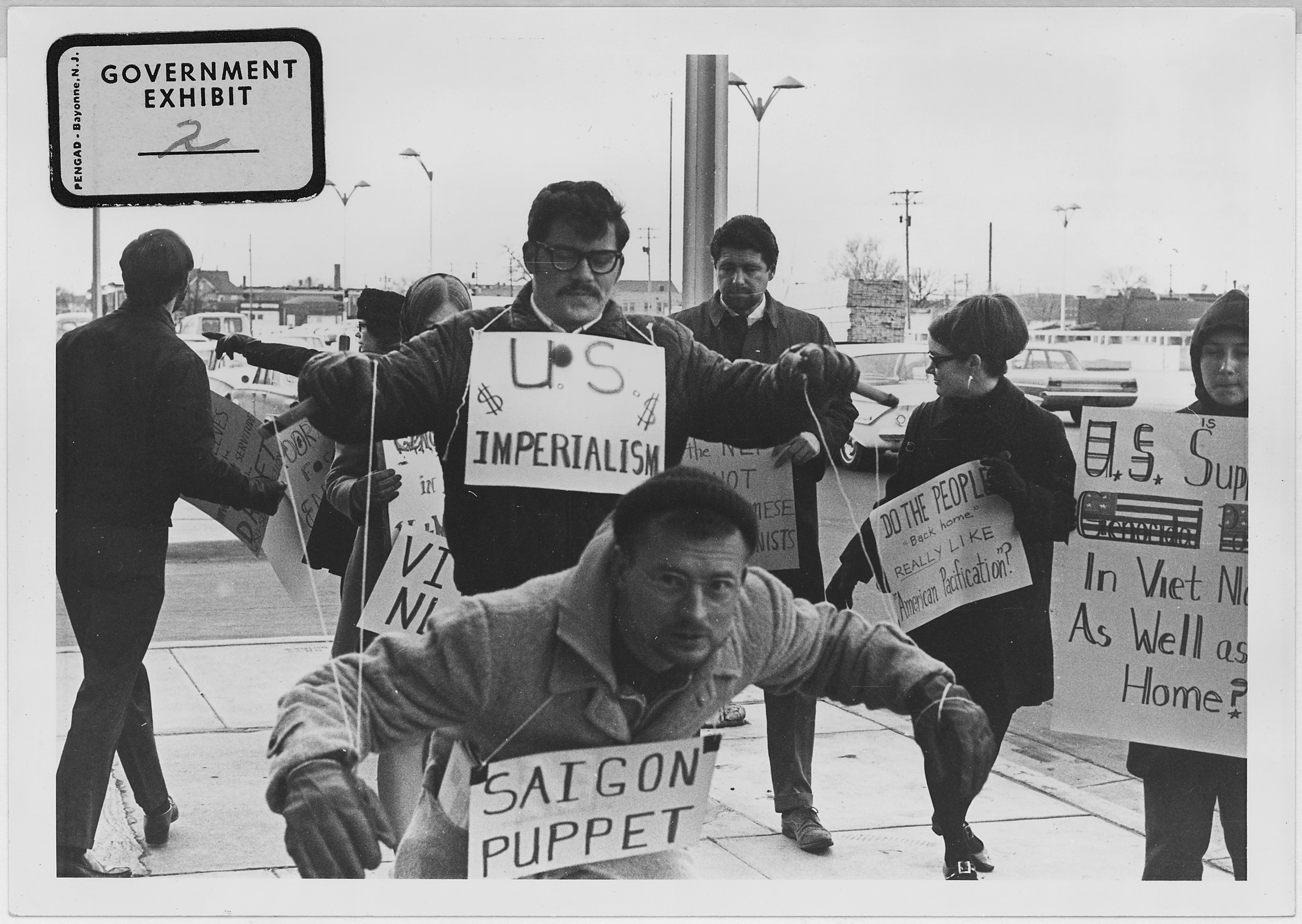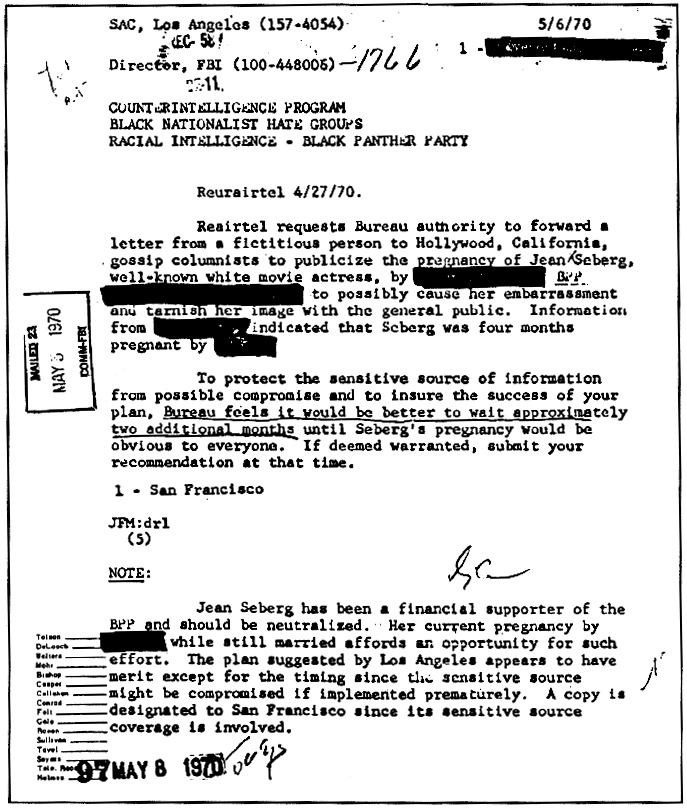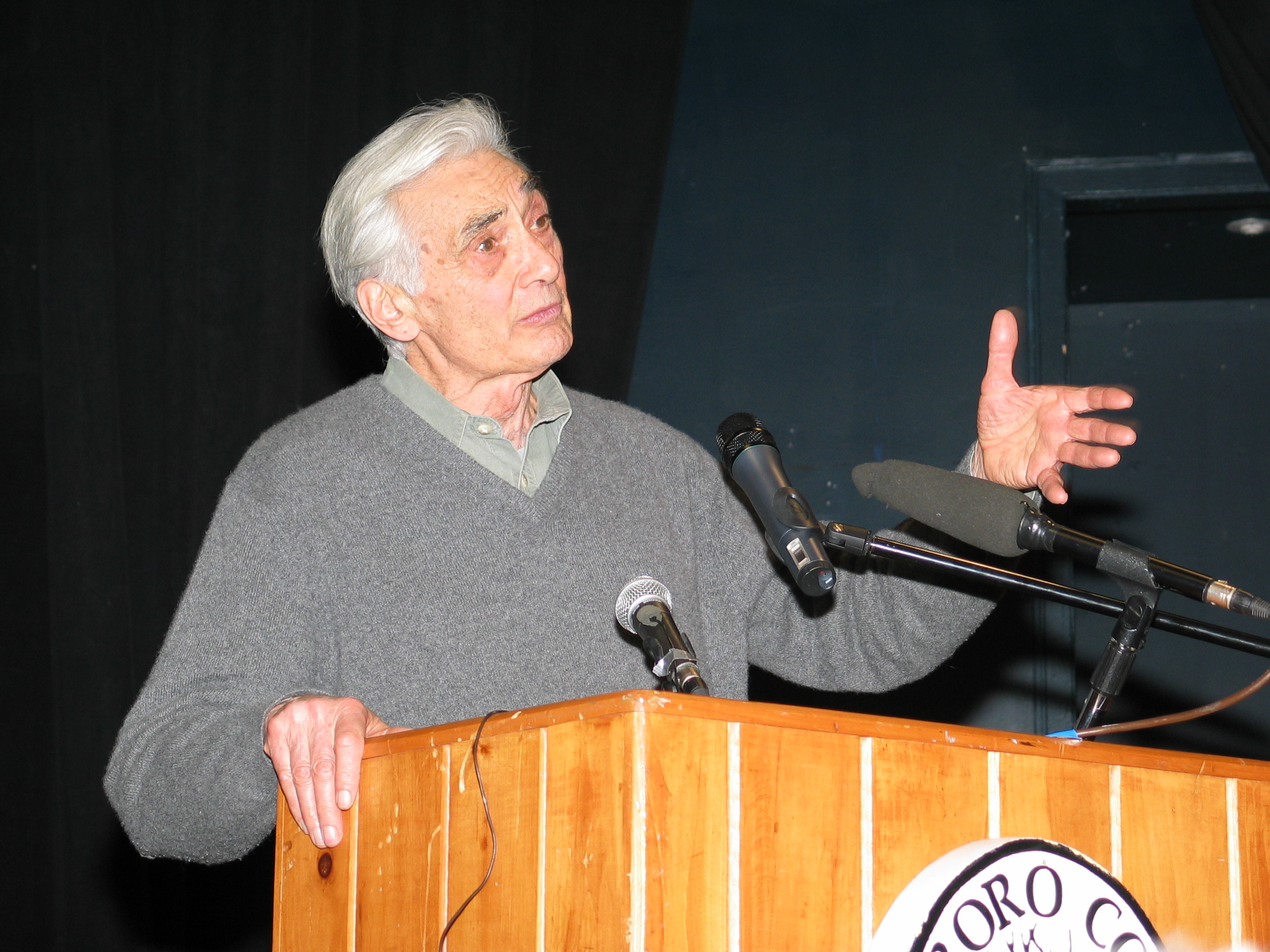|
Camden 28
The Camden 28 were a group of leftist, Catholic, anti-Vietnam War activists who in 1971 planned and executed a raid on a draft board in Camden, New Jersey, United States. The raid resulted in a high-profile criminal trial of the activists that was seen by many as a referendum on the Vietnam War and as an example of jury nullification. The goal The goal of the group was to make a bold statement in opposition to the war in Vietnam by way of sabotaging the portion of the draft process that was administered through the local draft board in Camden. Their plan was to break into the draft board offices at night and search for, collect, and either destroy or remove the records of all Class 1-A status draft registrants. It was to be both a symbolic and real blow to the process through which tens of thousands of young American men were being drafted and sent to fight in Vietnam. They wrote in a statement before trial: We are twenty-eight men and women who, together with other resiste ... [...More Info...] [...Related Items...] OR: [Wikipedia] [Google] [Baidu] |
Opposition To United States Involvement In The Vietnam War
Opposition to United States involvement in the Vietnam War (before) or anti-Vietnam War movement (present) began with demonstrations in 1965 against the escalating role of the United States in the Vietnam War and grew into a broad social movement over the ensuing several years. This movement informed and helped shape the vigorous and polarizing debate, primarily in the United States, during the second half of the 1960s and early 1970s on how to end the war. Many in the peace movement within the United States were children, mothers, or counterculture of the 1960s, anti-establishment youth. Opposition grew with participation by the African-American civil rights, second-wave feminist movements, Chicano Movements, and sectors of organized labor. Additional involvement came from many other groups, including educators, clergy, academics, journalists, lawyers, physicians such as Benjamin Spock, and military veterans. Their actions consisted mainly of peaceful, nonviolent events; few ... [...More Info...] [...Related Items...] OR: [Wikipedia] [Google] [Baidu] |
Selective Service System
The Selective Service System (SSS) is an Independent agencies of the United States government, independent agency of the Federal government of the United States, United States government that maintains information on U.S. Citizenship of the United States, citizens and other U.S. residents potentially subject to conscription in the United States, military conscription (i.e., the draft) and carries out contingency planning and preparations for two types of draft: a general draft based on registration lists of men aged 18–25, and a special-skills draft based on professional licensing lists of workers in specified health care occupations. In the event of either type of draft, the Selective Service System would send out induction notices, adjudicate claims for deferments or exemptions, and assign draftees classified as conscientious objectors to alternative service work. All male Citizenship in the United States, U.S. citizens and immigrant non-citizens who are between the ages of 18 ... [...More Info...] [...Related Items...] OR: [Wikipedia] [Google] [Baidu] |
COINTELPRO
COINTELPRO ( syllabic abbreviation derived from Counter Intelligence Program; 1956–1971) was a series of covert and illegal projects actively conducted by the United States Federal Bureau of Investigation (FBI) aimed at surveilling, infiltrating, discrediting, and disrupting domestic American political organizations. FBI records show COINTELPRO resources targeted groups and individuals the FBI deemed subversive, including feminist organizations, the Communist Party USA,. anti–Vietnam War organizers, activists of the civil rights and Black power movements (e.g. Martin Luther King Jr., the Nation of Islam, and the Black Panther Party), environmentalist and animal rights organizations, the American Indian Movement (AIM), Chicano and Mexican-American groups like the Brown Berets and the United Farm Workers, independence movements (including Puerto Rican independence groups such as the Young Lords and the Puerto Rican Socialist Party), a variety of organizations that were part of ... [...More Info...] [...Related Items...] OR: [Wikipedia] [Google] [Baidu] |
Democracy Now!
''Democracy Now!'' is an hour-long American TV, radio, and Internet news program hosted by journalists Amy Goodman (who also acts as the show's executive producer), Juan González, and Nermeen Shaikh. The show, which airs live each weekday at 8 a.m. Eastern Time, is broadcast on the Internet and via more than 1,400 radio and television stations worldwide. The program combines news reporting, interviews, investigative journalism and political commentary, with a focus on peace activism linked to environmental justice and social justice, guided by the ethics of ecofeminism as a philosophy. It documents social movements, struggles for justice, activism challenging corporate power and operates as a watchdog outfit regarding the effects of American foreign policy. ''Democracy Now!'' views as its aim to give activists and the citizenry a platform to debate people from "The Establishment". The show is described as progressive by fans as well as critics, but Goodman rejects that label ... [...More Info...] [...Related Items...] OR: [Wikipedia] [Google] [Baidu] |
Howard Zinn
Howard Zinn (August 24, 1922January 27, 2010) was an American historian, playwright, philosopher, socialist thinker and World War II veteran. He was chair of the history and social sciences department at Spelman College, and a political science professor at Boston University. Zinn wrote over 20 books, including his best-selling and influential '' A People's History of the United States'' in 1980. In 2007, he published a version of it for younger readers, ''A Young People's History of the United States''. Zinn described himself as "something of an anarchist, something of a socialist. Maybe a democratic socialist." He wrote extensively about the civil rights movement, the anti-war movement and labor history of the United States. His memoir, ''You Can't Be Neutral on a Moving Train'' (Beacon Press, 2002), was also the title of a 2004 documentary about Zinn's life and work. Zinn died of a heart attack in 2010, at age 87. Early life Zinn was born to a Jewish immigrant family in B ... [...More Info...] [...Related Items...] OR: [Wikipedia] [Google] [Baidu] |
Misdemeanor
A misdemeanor (American English, spelled misdemeanour elsewhere) is any "lesser" criminal act in some common law legal systems. Misdemeanors are generally punished less severely than more serious felonies, but theoretically more so than administrative infractions (also known as minor, petty, or summary offences) and regulatory offences. Typically, misdemeanors are punished with monetary fines or community service. Distinction between felonies and misdemeanors A misdemeanor is considered a crime of lesser seriousness, and a felony one of greater seriousness. The maximum punishment for a misdemeanor is less than that for a felony under the principle that the punishment should fit the crime. One standard for measurement is the degree to which a crime affects others or society. Measurements of the degree of seriousness of a crime have been developed. In the United States, the federal government generally considers a crime punishable with incarceration for not more than one ... [...More Info...] [...Related Items...] OR: [Wikipedia] [Google] [Baidu] |
Plea-bargain
A plea bargain (also plea agreement or plea deal) is an agreement in criminal law proceedings, whereby the prosecutor provides a concession to the defendant in exchange for a plea of guilt or ''nolo contendere.'' This may mean that the defendant will plead guilty to a less serious charge, or to one of the several charges, in return for the dismissal of other charges; or it may mean that the defendant will plead guilty to the original criminal charge in return for a more lenient sentence. A plea bargain allows both parties to avoid a lengthy criminal trial and may allow criminal defendants to avoid the risk of conviction at trial on a more serious charge. For example, in the legal system of the United States, a criminal defendant charged with a felony theft charge, the conviction of which would require imprisonment in state prison, may be offered the opportunity to plead guilty to a misdemeanor theft charge, which may not carry a custodial sentence. In cases such as an automobile ... [...More Info...] [...Related Items...] OR: [Wikipedia] [Google] [Baidu] |
Felony
A felony is traditionally considered a crime of high seriousness, whereas a misdemeanor is regarded as less serious. The term "felony" originated from English common law (from the French medieval word "félonie") to describe an offense that resulted in the confiscation of a convicted person's land and goods, to which additional punishments including capital punishment could be added; other crimes were called misdemeanors. Following conviction of a felony in a court of law, a person may be described as a felon or a convicted felon. Some common law countries and jurisdictions no longer classify crimes as felonies or misdemeanors and instead use other distinctions, such as by classifying serious crimes as indictable offences and less serious crimes as summary offences. In the United States, where the felony/misdemeanor distinction is still widely applied, the federal government defines a felony as a crime punishable by death or imprisonment in excess of one year. If punishable by e ... [...More Info...] [...Related Items...] OR: [Wikipedia] [Google] [Baidu] |
Howard Zinn At Camden 28 Trial
Howard is an English-language given name originating from Old French Huard (or Houard) from a Germanic source similar to Old High German ''*Hugihard'' "heart-brave", or ''*Hoh-ward'', literally "high defender; chief guardian". It is also probably in some cases a confusion with the Old Norse cognate ''Haward'' (''Hávarðr''), which means "high guard" and as a surname also with the unrelated Hayward. In some rare cases it is from the Old English ''eowu hierde'' "ewe herd". In Anglo-Norman the French digram ''-ou-'' was often rendered as ''-ow-'' such as ''tour'' → ''tower'', ''flour'' (western variant form of ''fleur'') → ''flower'', etc. (with svarabakhti). A diminutive is "Howie" and its shortened form is "Ward" (most common in the 19th century). Between 1900 and 1960, Howard ranked in the U.S. Top 200; between 1960 and 1990, it ranked in the U.S. Top 400; between 1990 and 2004, it ranked in the U.S. Top 600. People with the given name Howard or its variants include: Given ... [...More Info...] [...Related Items...] OR: [Wikipedia] [Google] [Baidu] |
Informant
An informant (also called an informer or, as a slang term, a “snitch”) is a person who provides privileged information about a person or organization to an agency. The term is usually used within the law-enforcement world, where informants are officially known as confidential human sources (CHS), or criminal informants (CI). It can also refer pejoratively to someone who supplies information without the consent of the involved parties."The Weakest Link: The Dire Consequences of a Weak Link in the Informant Handling and Covert Operations Chain-of-Command" by M Levine. ''Law Enforcement Executive Forum'', 2009 The term is commonly used in politics, industry, entertainment, and academia. In the United States, a confidential informant or "CI" is "any individual who provides useful and credible information to a law enforcement agency regarding felonious criminal activities and from whom the agency expects or intends to obtain additional useful and credible information regardin ... [...More Info...] [...Related Items...] OR: [Wikipedia] [Google] [Baidu] |
Citizens' Commission To Investigate The FBI
The Citizens' Commission to Investigate the FBI was an activist group operational in the US during the early 1970s. Their only known action was breaking into a two-man Media, Pennsylvania, office of the Federal Bureau of Investigation (FBI) and stealing over 1,000 classified documents. They then mailed these documents anonymously to several US newspapers to expose numerous illegal FBI operations which were infringing on the First Amendment rights of American civilians. Most news outlets initially refused to publish the information, saying it related to ongoing operations and that disclosure might have threatened the lives of agents or informants. However, ''The Washington Post'', after affirming the veracity of the files which the Commission sent them, ran a front-page story on March 24, 1971, at which point other media organizations followed suit. "The complete collection of political documents ripped off from the F.B.I. office in Media, Pa., March 8, 1971" was published for t ... [...More Info...] [...Related Items...] OR: [Wikipedia] [Google] [Baidu] |
Frank Pommersheim
Frank Pommersheim is an American professor, author, and poet specializing in the field of American Indian law. Pommersheim is serving on several tribal appellate courts and serves as the Chief Justice for the Cheyenne River Sioux Tribal Court of Appeals and the Rosebud Sioux Supreme Court and is also notable for his involvement in The Camden 28. Early life and education Frank Pommersheim was born in New York City but moved to the Rosebud Sioux Reservation in 1974 where he worked for 10 years before joining the University of South Dakota faculty in 1984. Pommersheim graduated in 1965 with a Bachelor of Arts from Colgate University. He earned a J.D. from Columbia Law School in 1968 and a MPA from Harvard University. Pommersheim was employed as the Director of Dakota Plains Legal Service from 1980 to 1983. As a Senior Consumer Law Specialist for the New York City Department of Consumer Affairs from 1971 to 1973 and as an Attorney and Volunteer Leader for the VISTA program in ... [...More Info...] [...Related Items...] OR: [Wikipedia] [Google] [Baidu] |






